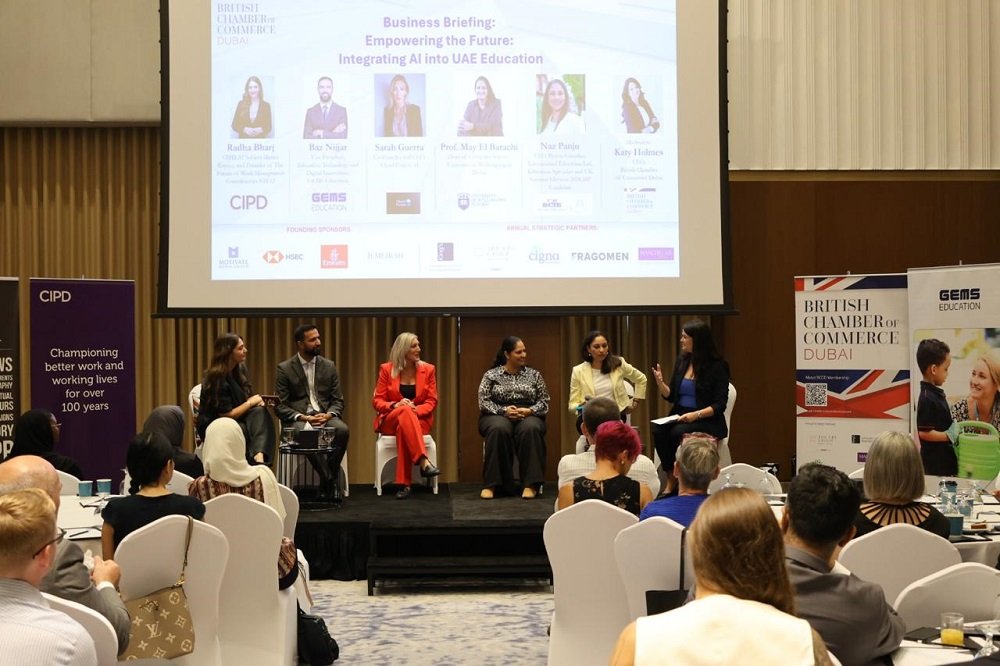A BCCD-hosted discussion highlight the needs to balance innovation with human-centred learning
Dubai, June 10, 2025: Education leaders, technology experts and policy makers came together at a recent panel hosted by the British Chamber of Commerce Dubai (BCCD) to explore the transformative potential and pressing challenges of artificial intelligence (AI) in the classroom. The discussion, prompted by the UAE government’s bold directive to introduce AI as a core subject from kindergarten to grade 12, touched on key themes such as personalised learning, data-driven performance tracking, ethical concerns and the evolving role of teachers in a tech-driven education system. As AI becomes more embedded in schools, panelists stressed the need for responsible implementation that balances innovation with human-centred learning.
Personalising learning, easing teacher load
Experts are of the view that one of the main opportunities of integrating AI into the classroom is the personalisation of learning. Naz Panju, CEO of British Canadian International Education Ltd, said, “The leading intervention to improve student performance is personal tutoring, and AI offers the opportunity for every child to have a one-on-one personal tutor that works at their own pace.” Panju also points out the potential to free up teachers’ time to provide more mentoring and pastoral care. She adds, “AI will ultimately overtake educators in terms of knowledge transfer. Teachers going forward need to focus on making students ‘more human’ than ever before and develop skills that encourage agency, critical thinking and self-motivation. This will help students adapt more easily to high-velocity careers – that should be the future of education.”
Sarah Guerra, Co-Founder and CEO of Cloud Fusion AI, highlighted the opportunities to help monitor performance and predict learning trends to facilitate better informed decisions in education planning. She said, “Our platform provides real-time data reporting on student performance. Parents can login to the system to get insights on their child’s progress in the context of their peers. It can also forecast future academic development to create tailored solutions based on each student’s learning needs and provide data-driven insights that enable institutions to make more strategic decisions in line with KHDA benchmarks.”
Contrary to concerns that AI will dilute the development of essential skills, Baz Nijjar, Vice President – Education Technology and Digital Innovation at GEMS Education, said that, when used in the right context, the technology would enhance learning. “AI tools can offer a different way to develop skills that are already being taught. For example, developing prompts for generative AI helps to build students’ capacity in critical thinking and problem solving. When it is mapped to the existing curriculum and used with a purpose, AI can add value to the learning experience,” he explained.
Ethics and governance
Looking to the future of work, Radha Bharj, Founder of The Future of Work Management Consultancies FZCO, said that AI literacy would be critical to every industry. “The most important thing is enabling a culture of curiosity and experimentation with AI to drive innovation and growth while ensuring it is used responsibly and ethically,” she said.
Among the most prevalent challenges surrounding AI in the classroom is ensuring that it is used in an ethical and responsible manner. Prof. May El Barachi, Dean of Computer Science at the University of Wollongong in Dubai, highlighted the concerns around academic integrity, excessive screen time, privacy breeches and data hoarding, saying that AI use needs to be driven by human values. “Institutions need to establish a culture for the use of AI that focusses on self-empowerment, governed by transparent and auditable policies. Technology is valuable in a hybrid ecosystem, but it can never replace the guidance and mentorship provided by teachers, and that respect for humanity must remain,” she said.
Highlighting Elon Musk’s prediction that AI will outsmart all humans by 2029, Panju reflected on the surreal world mankind is entering. “We are facing the prospect of a whole new species that feels human. There is a fear of pessimism towards a world that we don’t fully understand, which makes it difficult to regulate, but regulation will be important to establish a direction for the future of AI,” she said.
Amplifying inherent biases
While AI may become smarter than all of humanity, it is yet to tackle some of mankind’s innate characteristics. “AI can perpetuate or amplify inherent human biases because they are introduced through training data or algorithms. There is an over-reliance on the black box model where the output is not reasoned and transparent, which is why we need to develop more explainable AI solutions,” explained Prof. El Barachi.
One of the primary concerns among parents is the impact of AI on socialisation, but as Bharj pointed out, young people will still need to work on their human skills to succeed. “Career paths will become less linear and while parts of many roles will be automated, it’s human skills that will set us apart. Skills such as critical thinking, creativity, empathy and collaboration will be the key differentiators, enabling us to solve complex problems, lead with impact and navigate change with agility and empathy,” said Bharj.
Reimagining assessment
The bold move by the UAE Ministry of Education has accelerated conversations around updating approaches to assessment, with all the experts predicting AI integration as a catalyst for change. “We need a 360-degree approach that combines traditional methods with a competency-based framework, to develop well-rounded individuals that can demonstrate skills like entrepreneurship and active leadership. The UAE has the opportunity to lead in this regard as it sets the benchmark for AI in education,” said Nijjar.
“The UAE’s decision to embed AI into public schools reflects its wider ambition to lead in innovation and future-readiness. Within the Chamber, we are closely following developments in AI and their impact across sectors. The Chamber embraces its role to help bridge the gap between academia and industry by creating an open forum for knowledge-sharing and discussion,” said Katy Holmes, CEO of BCCD.
“As AI becomes more deeply embedded in education, it’s vital that educators and employers stay aligned to ensure future graduates are equipped with the right mix of technical and human skills,” added Holmes.








